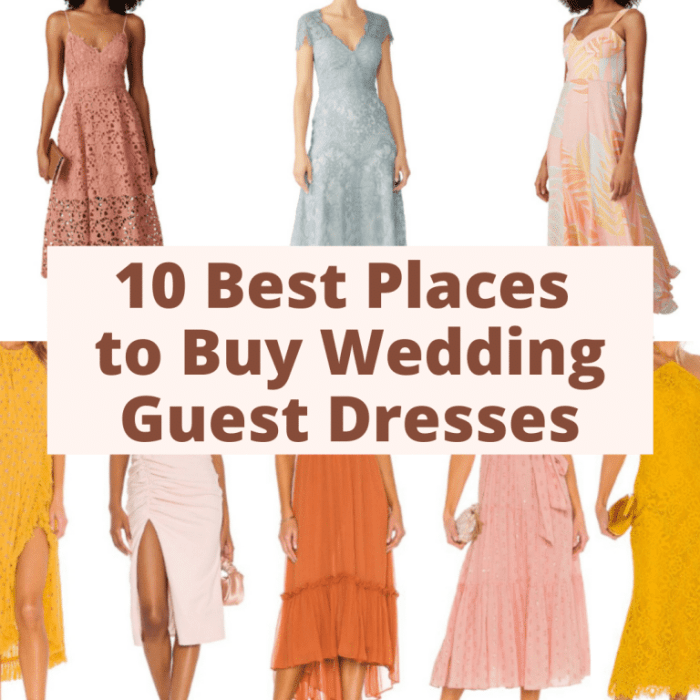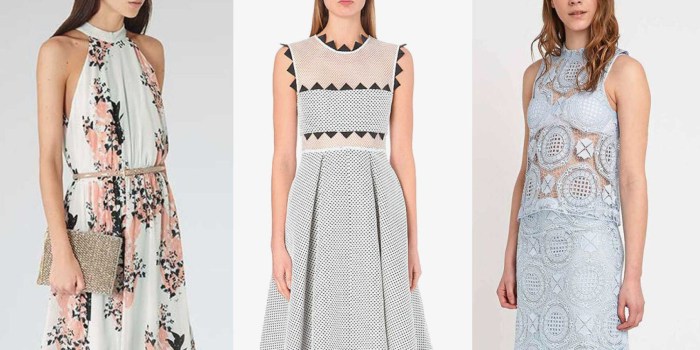Finding the Perfect Wedding Dress: Best Places To Find Dresses For Weddings
Best places to find dresses for weddings – Choosing a wedding dress is a significant milestone in wedding planning. This guide explores various avenues for finding your dream dress, from online retailers to brick-and-mortar stores, covering diverse styles, budgeting strategies, and unique alternatives.
Finding Dresses Online
Online shopping offers convenience and a vast selection. However, careful consideration is crucial to minimize risks and ensure a positive experience. The following sections detail reputable online retailers, shopping tips, and a comparison of popular platforms.
| Retailer | Price Range | Dress Styles Offered | Website URL |
|---|---|---|---|
| ASOS | Budget-friendly | A-line, bodycon, bohemian, etc. | www.asos.com |
| Lulus | Budget-friendly to Mid-range | A-line, sheath, tea-length, etc. | www.lulus.com |
| Nordstrom | Mid-range to Luxury | Wide variety, including designer brands | www.nordstrom.com |
| BHLDN | Mid-range to Luxury | Bohemian, romantic, vintage-inspired | www.bhldn.com |
| David’s Bridal | Budget-friendly to Mid-range | Extensive selection, various styles and sizes | www.davidsbridal.com |
| Azazie | Budget-friendly to Mid-range | Many styles, customizable options | www.azazie.com |
| Revolve | Mid-range to Luxury | Trendy and contemporary styles | www.revolve.com |
| Net-a-Porter | Luxury | High-end designer gowns | www.net-a-porter.com |
| Rent the Runway | Mid-range to Luxury (rental) | Designer gowns available for rent | www.renttherunway.com |
| JJ’s House | Budget-friendly to Mid-range | A wide variety of styles, including custom options | www.jjshouse.com |
Five Tips for Successful Online Wedding Dress Shopping:
- Check return policies carefully before purchasing.
- Read reviews from other customers.
- Order multiple sizes to ensure a proper fit.
- Use the retailer’s size chart and measuring guide accurately.
- Contact customer service if you have any questions or concerns.
| Retailer | Pros | Cons | Return Policy Summary |
|---|---|---|---|
| Nordstrom | Wide selection, trusted brand, excellent customer service | Higher price point | Generally accepts returns within a specific timeframe with original tags attached. |
| BHLDN | Unique and stylish dresses, excellent customer service | Limited selection compared to larger retailers | Returns are typically accepted within a certain period, subject to conditions. |
| ASOS | Budget-friendly, wide variety of styles | Quality can vary, less personalized service | Returns are generally accepted with some exceptions; check their website for details. |
Brick-and-Mortar Stores, Best places to find dresses for weddings

Source: veryeasymakeup.com
Purchasing a wedding dress from a physical store offers a tangible experience and the benefit of expert advice. However, it often involves a higher price point and less selection than online shopping. The following Artikels the advantages and disadvantages of both options, along with different types of stores.
Advantages of buying from a physical store include the ability to try on dresses, receive personalized styling advice, and have alterations done on-site. Disadvantages include limited selection, higher prices, and potential travel time.
Advantages of buying online include a wider selection, lower prices, and convenience. Disadvantages include the inability to try on dresses, potential shipping delays, and the risk of receiving an item that doesn’t fit or meet expectations.
Three Types of Brick-and-Mortar Stores:
- Bridal Boutiques: Typically offer a curated selection of designer gowns, with a higher price range (often $1,500 – $10,000+).
- Department Stores: Carry a wider range of styles and brands at various price points (from budget-friendly to luxury).
- Consignment Shops: Offer pre-owned wedding dresses at significantly lower prices, providing a budget-friendly option.
Five Questions to Ask a Bridal Consultant:
- What styles do you recommend based on my body type and wedding venue?
- What is your alteration policy?
- What is your average turnaround time for alterations?
- What payment options do you offer?
- Can I bring a guest for a second opinion?
Dress Styles and Considerations

Source: sandiegotowingca.com
Choosing a wedding dress style involves considering various factors, including venue, season, body type, and personal style. The following sections explore different styles and provide examples suitable for various wedding settings.
Factors to Consider:
- Venue: A formal church wedding might call for a more traditional gown, while a beach wedding might suit a flowing, bohemian style.
- Season: Lightweight fabrics are ideal for summer weddings, while heavier fabrics are suitable for winter weddings.
- Body Type: Different styles flatter different body types. A-line dresses are generally flattering on most body types.
- Personal Style: Choose a dress that reflects your personality and preferences.
Five Wedding Dress Styles:
- A-line: Fitted at the bodice and gradually flares out from the waist, flattering most body types.
- Ballgown: Full skirt with a fitted bodice, creating a dramatic and princess-like silhouette, suitable for those who want a statement piece.
- Mermaid: Fitted through the hips and flares out at the knees, accentuating curves, best for those with an hourglass figure.
- Sheath: Straight and form-fitting from shoulder to hem, suitable for those with a slender build.
- Empire Waist: Fitted bodice just below the bust and flows loosely to the floor, ideal for those who want a comfortable and flattering style.
Visual Descriptions of Wedding Dresses for Different Venues:
- Beach Wedding: A flowing chiffon gown with delicate lace detailing, a relaxed silhouette, and minimal embellishments.
- Formal Church Wedding: A classic ballgown with intricate beading or embroidery, a structured silhouette, and luxurious fabrics like satin or silk.
- Rustic Barn Wedding: A romantic lace gown with a bohemian feel, featuring delicate floral appliqués, a relaxed fit, and a flowing skirt.
Budgeting and Financing
Setting a realistic budget and exploring financing options are crucial for managing the cost of a wedding dress. The following sections detail budgeting strategies and financing options.
Three Budgeting Strategies:
- Percentage-Based: Allocate a specific percentage of your overall wedding budget to the dress (e.g., 10-15%).
- Fixed-Amount: Set a predetermined amount you’re willing to spend on the dress, regardless of the overall budget.
- Tiered Approach: Establish different price tiers and explore options within each tier before making a decision.
Five Tips for Staying Within Budget:
- Shop during off-season sales.
- Consider sample sales or consignment shops.
- Prioritize what matters most (e.g., fabric quality over extensive embellishments).
- Set a realistic budget and stick to it.
- Explore financing options to spread payments over time.
Financing Options:
- Layaway Plans: Allow you to pay for the dress in installments over a set period.
- Payment Plans: Similar to layaway, but often with interest charges.
- Credit Cards: Use a credit card with a rewards program to earn points or cashback.
Finding Unique or Alternative Options
Beyond traditional bridal shops, several alternative options exist for finding a unique or budget-friendly wedding dress. The following explores these alternatives and compares their advantages and disadvantages.
Finding the perfect dress for a wedding can be a delightful challenge, with numerous boutiques and online stores offering a wide array of styles. For those seeking a flattering and comfortable option, consider an A-line silhouette; a great example is this stylish a line wedding guest dress plus size which offers a range of sizes. Ultimately, the best place to find your dream wedding attire depends on personal preference and budget, so explore various options to discover the perfect fit.
Three Alternative Options:
- Vintage Shops: Offer one-of-a-kind dresses with unique styles and details at a fraction of the cost of a new gown.
- Rental Services: Allow you to rent a designer gown for a fraction of the purchase price, perfect for those who only need the dress for one day.
- Custom Designers: Provide a personalized experience, allowing you to create a dress tailored to your specific vision and body type.
Pre-owned vs. Rented vs. New:
- Pre-owned: Offers significant cost savings but requires careful inspection for condition and alterations.
- Rented: Provides a budget-friendly option but may have limited availability and styling options.
- New: Offers the widest selection and ensures the dress is in pristine condition, but comes with the highest price tag.
Five Unique Wedding Dress Styles:
- Two-Piece Separates: Offers versatility and allows for mixing and matching different tops and skirts.
- Jumpsuit: A modern and stylish alternative to a traditional gown, suitable for a less formal wedding.
- Pantsuit: A sophisticated and chic option for a modern or non-traditional wedding.
- Short Dress: A playful and fun option for a casual or beach wedding.
- Color-Blocked Dress: A bold and unique choice that incorporates multiple colors.
FAQ Corner
What is the average cost of a wedding dress?
The average cost varies greatly depending on factors like designer, style, and retailer. Expect a wide range from a few hundred dollars to several thousand.
How far in advance should I start shopping for my wedding dress?
Ideally, begin searching 9-12 months before your wedding to allow ample time for alterations and potential delays.
What should I bring to a bridal appointment?
Bring comfortable undergarments, shoes similar to what you plan to wear on your wedding day, and photos of dresses you like for inspiration.
Can I alter a wedding dress I bought online?
Yes, most alterations are possible, but factor the cost into your budget. Check with a local seamstress for pricing.
What if my online order doesn’t fit?
Review the retailer’s return policy carefully before purchasing. Most reputable retailers offer returns or exchanges within a specific timeframe.
